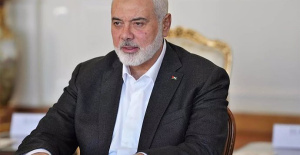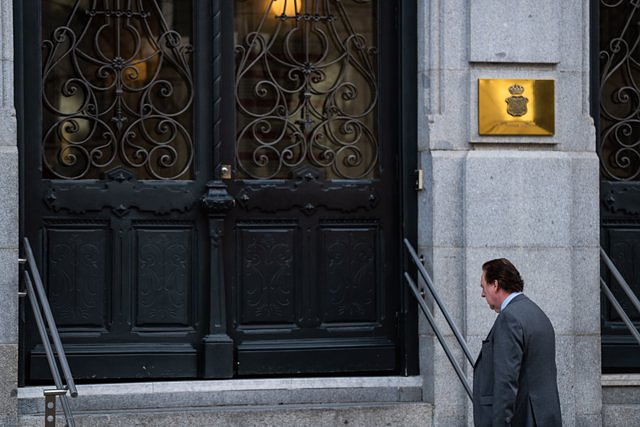MADRID, 29 Nov. (EUROPA PRESS) -
The members of the General Council of the Judiciary (CGPJ) María Ángeles Carmona, Carmen Llombart and José Antonio Ballesteros have questioned this Wednesday that the decision on the admission to processing of the extension of the amparo requested by the judge of the National Court investigating to Democratic Tsunami in a "context of serious generalized questioning of judicial work".
The three members have cast a dissenting vote, reported by Europa Press, on the decision adopted by the Permanent Commission this Wednesday, which consisted of postponing that admission to include a few words from ERC deputy Gabriel Rufián against magistrate Manuel García Castellón .
It is worth remembering that the head of the Central Court of Instruction Number 6 initially went to the CGPJ asking for protection due to statements made by the then 'number two' of Justice, Tonxtu Rodríguez, in a radio interview and others by the spokesperson for the Government of the Generalitat of Catalonia. , Patricia Plaja, in a press conference.
The CGPJ admitted that initial request for processing considering that "there is sufficient basis to admit the request for processing." Once the allegations from Rodríguez and Plaja have been received, the matter will be submitted again to the Permanent Commission for the adoption of a final resolution.
The governing body of the judges clarified this Wednesday that the processing of this first protection will continue "until the moment in which a resolution must be issued, which must also be postponed until the Second Chamber of the high court rules on its jurisdiction to process that procedure."
However, regarding the extension of protection relating to Rufián, the Permanent Commission has chosen to postpone the decision on admission to processing pending the Supreme Court.
The members who have cast the dissenting vote assure, however, that "there is no new fact that allows suspending the decision of the amparo procedure already initiated, or the admission for processing of the requested extension until the moment in which the Court of Appeals Criminal Court of the Supreme Court rules on the reasoned statement submitted by García Castellón and the competent body is determined."
"This is so because, even if the Investigative Court of the National Court had ceased to hear the matter, this would not mean there would be a sudden loss of object, because this would be equivalent to affirming, without any legal basis, that the protection is only can be granted within a certain period of time, even though the damage or interference in judicial independence had been consummated and persisted over time," they maintain.
In his opinion, "it will happen even less if the Investigative Court continues to be competent, as it is, as long as the Supreme Court does not admit its jurisdiction." "Competence that, moreover, would not necessarily have to be extended to the entire case as there are also non-certified parties involved, in accordance with the consolidated jurisprudence of the Second Chamber," he adds.
Along these lines, they emphasize that "it cannot be maintained that there is a legal cause for suspension of the administrative protection file." "The agreement with which we disagree does not cite any legal precept on which to support said suspension. We understand therefore that the agreement should have consisted, in the first place, of admitting the extension of the protection requested by García Castellón in order, otherwise, not to contradict the admission of the initial claim," they argue.
Finally, they consider that "the processing of the file already started should have continued, instead of adopting a suspension subject, in turn, to a suspensive period." "All this," they conclude, "in a context of serious widespread questioning of judicial work."

 Exploring Cardano: Inner Workings and Advantages of this Cryptocurrency
Exploring Cardano: Inner Workings and Advantages of this Cryptocurrency Seville.- Economy.- Innova.- STSA inaugurates its new painting and sealing hangar in San Pablo, for 18 million
Seville.- Economy.- Innova.- STSA inaugurates its new painting and sealing hangar in San Pablo, for 18 million Innova.- More than 300 volunteers join the Andalucía Compromiso Digital network in one month to facilitate access to ICT
Innova.- More than 300 volunteers join the Andalucía Compromiso Digital network in one month to facilitate access to ICT Innova.-AMP.- Ayesa acquires 51% of Sadiel, which will create new technological engineering products and expand markets
Innova.-AMP.- Ayesa acquires 51% of Sadiel, which will create new technological engineering products and expand markets Hamas views Israel's latest deal proposal in "positive spirit"
Hamas views Israel's latest deal proposal in "positive spirit" The Ibex 35 rises 0.22% mid-session driven by Aena (4.66) and Sabadell (4.57%)
The Ibex 35 rises 0.22% mid-session driven by Aena (4.66) and Sabadell (4.57%) STATEMENT: Selena Romero and Roberto Pérez winners of the 22nd Nacho Juncosa Memorial - International under-16 tennis tournament
STATEMENT: Selena Romero and Roberto Pérez winners of the 22nd Nacho Juncosa Memorial - International under-16 tennis tournament STATEMENT: DH2 Energy is the winner in the first European renewable hydrogen auction
STATEMENT: DH2 Energy is the winner in the first European renewable hydrogen auction How Blockchain in being used to shape the future
How Blockchain in being used to shape the future Not just BTC and ETH: Here Are Some More Interesting Coins Worth Focusing on
Not just BTC and ETH: Here Are Some More Interesting Coins Worth Focusing on UPV students design an app that helps improve the ventilation of homes in the face of high temperatures
UPV students design an app that helps improve the ventilation of homes in the face of high temperatures Ivace and promotes a less invasive device for the early detection of prostate cancer
Ivace and promotes a less invasive device for the early detection of prostate cancer Valencia unanimously approves the ordinance to allocate spaces to test innovative initiatives
Valencia unanimously approves the ordinance to allocate spaces to test innovative initiatives UPV researchers promote a paid master's degree as a "talent factory" in integrated photonics
UPV researchers promote a paid master's degree as a "talent factory" in integrated photonics A million people demonstrate in France against Macron's pension reform
A million people demonstrate in France against Macron's pension reform Russia launches several missiles against "critical infrastructure" in the city of Zaporizhia
Russia launches several missiles against "critical infrastructure" in the city of Zaporizhia A "procession" remembers the dead of the Calabria shipwreck as bodies continue to wash up on the shore
A "procession" remembers the dead of the Calabria shipwreck as bodies continue to wash up on the shore Prison sentences handed down for three prominent Hong Kong pro-democracy activists
Prison sentences handed down for three prominent Hong Kong pro-democracy activists ETH continues to leave trading platforms, Ethereum balance on exchanges lowest in 3 years
ETH continues to leave trading platforms, Ethereum balance on exchanges lowest in 3 years Investors invest $450 million in Consensys, Ethereum incubator now valued at $7 billion
Investors invest $450 million in Consensys, Ethereum incubator now valued at $7 billion Alchemy Integrates Ethereum L2 Product Starknet to Enhance Web3 Scalability at a Price 100x Lower Than L1 Fees
Alchemy Integrates Ethereum L2 Product Starknet to Enhance Web3 Scalability at a Price 100x Lower Than L1 Fees Mining Report: Bitcoin's Electricity Consumption Declines by 25% in Q1 2022
Mining Report: Bitcoin's Electricity Consumption Declines by 25% in Q1 2022 Oil-to-Bitcoin Mining Firm Crusoe Energy Systems Raised $505 Million
Oil-to-Bitcoin Mining Firm Crusoe Energy Systems Raised $505 Million Microbt reveals the latest Bitcoin mining rigs -- Machines produce up to 126 TH/s with custom 5nm chip design
Microbt reveals the latest Bitcoin mining rigs -- Machines produce up to 126 TH/s with custom 5nm chip design Bitcoin's Mining Difficulty Hits a Lifetime High, With More Than 90% of BTC Supply Issued
Bitcoin's Mining Difficulty Hits a Lifetime High, With More Than 90% of BTC Supply Issued The Biggest Movers are Near, EOS, and RUNE during Friday's Selloff
The Biggest Movers are Near, EOS, and RUNE during Friday's Selloff Global Markets Spooked by a Hawkish Fed and Covid, Stocks and Crypto Gain After Musk Buys Twitter
Global Markets Spooked by a Hawkish Fed and Covid, Stocks and Crypto Gain After Musk Buys Twitter Bitso to offset carbon emissions from the Trading Platform's ERC20, ETH, and BTC Transactions
Bitso to offset carbon emissions from the Trading Platform's ERC20, ETH, and BTC Transactions Draftkings Announces 2022 College Hoops NFT Selection for March Madness
Draftkings Announces 2022 College Hoops NFT Selection for March Madness























